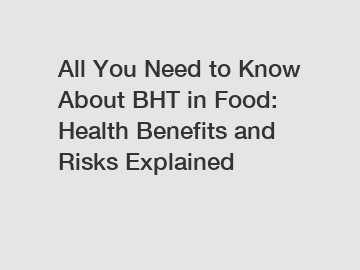All You Need to Know About BHT in Food: Health Benefits and Risks Explained
If you're someone who pays close attention to food labels and ingredients, you may have come across the term BHT. But what exactly is BHT, and should you be concerned about its presence in your food? In this blog post, we'll dive into everything you need to know about BHT in food - from its health benefits to potential risks.
BHT, or butylated hydroxytoluene, is a synthetic antioxidant commonly used in food to prevent spoilage and extend shelf life. It's often added to foods that contain fats or oils, as it helps to prevent them from becoming rancid. You can find BHT listed on food labels under its full name or as E321, its European food additive number.
One of the main health benefits of BHT is its ability to protect against oxidative stress. Oxidative stress occurs when free radicals in the body outnumber the antioxidants, leading to cell damage and inflammation. By neutralizing free radicals, BHT can help reduce the risk of chronic diseases such as heart disease, cancer, and diabetes.

Furthermore, BHT has been shown to have anti-inflammatory properties, which can help reduce inflammation in the body and protect against conditions such as arthritis and allergies. Some studies have also suggested that BHT may have antiviral and antimicrobial effects, making it useful in fighting off infections.
Despite these potential health benefits, there are also concerns about the safety of BHT in food. Some studies have linked BHT to adverse health effects, including hormone disruption, liver damage, and cancer. While the levels of BHT used in food are generally considered safe by regulatory agencies, it's still important to be aware of any potential risks associated with its consumption.
When it comes to the safety of BHT, it's important to consider the dose. Like many additives, BHT is safe in small quantities but can be harmful in large amounts. The Food and Drug Administration (FDA) has set limits on the amount of BHT that can be added to food, and it's generally recognized as safe (GRAS) when used in accordance with these guidelines.
It's also worth noting that some individuals may be more sensitive to BHT than others. If you have a known allergy or sensitivity to food additives, it's best to avoid products that contain BHT to prevent any adverse reactions.
If you're concerned about the presence of BHT in your food, there are a few steps you can take to minimize your exposure. First, try to choose whole, unprocessed foods whenever possible, as they are less likely to contain additives like BHT. Reading food labels carefully and opting for products that are free from artificial preservatives can also help reduce your intake of BHT.
Additionally, you can look for alternative antioxidants and preservatives that are considered safer and more natural. For example, vitamin E, also known as tocopherol, is a common antioxidant that is often used in place of BHT in food products. Rosemary extract is another natural antioxidant that can help prevent oxidation and spoilage in food.
In conclusion, BHT is a synthetic antioxidant that is commonly used in food to prevent spoilage and extend shelf life. While it does have potential health benefits, there are also concerns about its safety and possible risks. By being mindful of your intake and opting for natural alternatives, you can make informed choices about the foods you consume and minimize your exposure to BHT. Remember, knowledge is power when it comes to making healthy decisions about your diet.
Are you interested in learning more about bulk BHT FEED GRADE for sale, wholesale Flavour additives factory price, low price Sodium Benzoate Powder in bulk? Contact us today to secure an expert consultation!

Comments
0